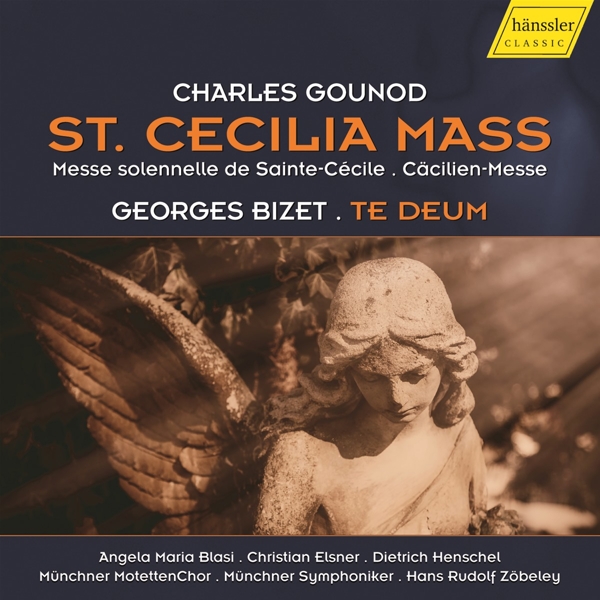| Comentarios / Titulos de las canciónes: |
St Cecilia Mass 01. "Kyrie" 01. "Kyrie" 02. "Gloria" 02. "Gloria" 03. "Credo" 03. "Credo" 04. "Sanctus" 04. "Sanctus" 05. "Benedictus" 05. "Benedictus" 06. "Agnus Die" 06. "Agnus Die"
Te Deum 07. "Te Deum laudamus" 07. "Te Deum laudamus" 08. "Tu Rex gloriae Christe" 08. "Tu Rex gloriae Christe" 09. "Te ergo quaesumus" 09. "Te ergo quaesumus" 10. "Fiat misericordia tua" 10. "Fiat misericordia tua"
|
 |
| Cantidades: |
1 |
 |
| Descripción: | The St. Cecilia´s Mass represents a very happy combination of strict Palestrina style and modern opera elements. Gounod had already composed his first opera, Sapho (1851), at the urging of the famous singer Pauline Viardot, whom he knew from Rome. Neither this opera nor his next two such works were a success on the stage, but the experience he had gathered with these dramatic works did him well in the mass. He exhibits fine, firm control in his treatment of the dramatic contrasts occurring in particular in the Gloria and Credo. The "laudamus te" in the Gloria, an Allegro pomposo, offers powerful solo and tutti effects. In the following Andante on the text "Domine fili unigenite" Gounod lends special emphasis to the "miserere nobis." The terzetto with choir featuring the imploring vocal gestures of the three bass, tenor and soprano soloists would do credit to any French grand opera. The Credo is completely oriented toward the idea of the community united in faith. The instrumentation with brass instruments is an open demonstration of firm Catholic conviction, and the clanging cymbals turn the ascension, "et ascendit in coelum," into a veritable triumphal march. Gounod´s somewhat high-handed treatment of the liturgically prescribed text of the Agnus Dei is also to be explained by his need to heighten the dramatic effect of the music at this point. The solo tenor and solo soprano sing the "Domine non sum dignus," (Lord, I am not worthy...), a text which normally finds it's liturgical place not in the Agnus Dei but in the communion rite. The individual admission of sin is thus placed over against the collective "miserere nobis." Gounod´s employment of these effects is extremely moderated in comparison to the practices in the grand opera. Beautiful melodies, catchy motifs repeated and varied with new texts, and simple accompaniment figures in the instrumental parts lend each mass unit a basic uniform mood., Runningtime: 00:00:00, Labelcode PROL19046.2 |
 |
| N° de fabricante: |
HC19046 |
 |
Seguridad del producto
Persona responsable para la UE:
kdg mediatech GmbH
Geschäftsführer: Michael Hosp
kdg mediatech GmbH/ Am kdg campus, Dorf 408, 6969 Elbigenalp, AT
fredi.perl@kdg.at |
 |





















